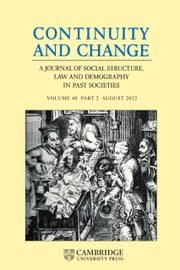Article contents
Providing for the elderly in eighteenth-century England
Published online by Cambridge University Press: 01 December 1998
Abstract
In 1776, in the parish of Puddletown, Dorset, Sarah Dibben, an elderly, impoverished widow, was examined as to her place of settlement by the local justice of the peace to determine whether the parish should pay for her poor relief. At the same time, the JP interviewed her son, Melchizedeck, with whom Sarah had been living, to shed further light on Sarah's situation. Melchizedeck told the justice that because Sarah was his mother he ‘thought it his Duty to assist her if he could without injuring his family’. However, he was at the marginal level of poverty himself, ‘having nothing but what he can earn to support his family’. As a consequence of these examinations, Sarah was removed to the neighbouring parish of Piddlehinton, where she had borne her children over forty years earlier.
The case of Sarah Dibben's settlement highlights the main issues surrounding provisions for the elderly in eighteenth-century England. (Here, the elderly are defined as those aged 60 and above.) The provisions of the poor law of 1601 meant that both the local community and the family had a legal obligation to support the aged. This law stated that ‘the aged and decrepit’ of every parish were to be supported by a tax, collected from all those who held property in the parish. At the same time, the law dictated:
The father and grandfather, mother and grandmother, and children of every poor, old, blind, lame and impotent person, or other person not able to work, being of sufficient ability, shall at their own charges, relieve and maintain every such poor person, in that manner, and according to that rate, as by the justices in sessions shall be assessed: on pain of 20s. a month. [I will be referring to this clause as the family-support section of the poor laws.]
- Type
- Research Article
- Information
- Copyright
- © 1998 Cambridge University Press
- 12
- Cited by




